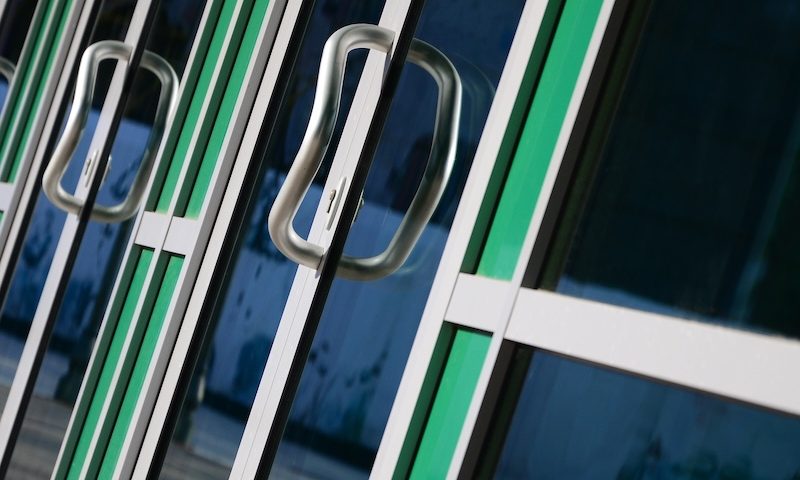At a Glance
Faulty doors can directly invalidate your business insurance if they compromise site security, breach fire safety regulations, or fail to meet policy requirements. Insurers may reject claims where poor door maintenance contributed to damage or theft. Regular inspections, proper locks, and up-to-date documentation are essential to keeping your policy valid.
The Overlooked Link Between Door Safety and Insurance Claims
In the event of a break-in or an emergency, the last thing you want is for your insurance claim to be denied because of a faulty door. But this is a problem many business owners in the UK are facing today because they aren’t aware of their business insurance requirements until it’s too late.
Whether your front door mechanism is broken or you have a fire exit that no longer seals properly, overlooked door maintenance could very well be the reason your insurance fails to pay out when you need it the most.
At Doorway Services, we understand the importance of these insurance policies for the continuity of your business, and not receiving your promised payout due to a minor issue can be frustrating. In this guide, we’re discussing how faulty doors can invalidate your business insurance and how to prevent this from happening. Contact us to ensure your doors meet insurance standards with expert maintenance and repair.
Why Faulty Doors Could Put Your Insurance at Risk
Many business insurance policies use terms such as ‘reasonable care’ and ‘site security’. This means it’s your responsibility to ensure your property is secure and maintained to a certain standard. If a break-in occurs and it turns out that a faulty lock or a damaged fire door was the reason, your insurer could argue you failed to fulfil the business insurance requirements.
In fact, many business insurance policies specifically require that all entry points be properly locked and regularly maintained, and failure to do so could provide a loophole for them to avoid payout. If your front door mechanism is broken, or you’re trying to figure out what to do if the door is not closing, these seemingly minor issues could cost you a valid insurance claim.
How Does Business Insurance Work with Security and Safety Standards?
There are different types of business insurance available based on the type of coverage you need. Depending on your setup, these include commercial property insurance, employers’ liability, public liability, and specialist policies for high-value assets.
Whatever cover you have, your insurer expects you to follow basic safety rules, especially around locks, alarms, and maintenance. Most business insurance requirements include:
- Locks that meet British Standard BS3621 on all external doors
- Functioning alarms and access control systems
- Fire doors that are compliant and regularly inspected
- Proper maintenance logs showing that safety-critical equipment is checked
Real-World Door Issues That Invalidate Claims
Just understanding your cover isn’t enough; you also need to be aware of the consequences if you don’t meet these business insurance requirements.
Let’s say you have a sliding automatic door at your retail store’s entrance that doesn’t close properly, leaving a small gap, and a theft occurs. The CCTV will show that the door wasn’t working properly, which might lead to your insurer rejecting your claim due to ‘failure to secure the premises.’
Similarly, if you have a warehouse and your side fire door has a missing seal, this minor defect may allow smoke from a fire to pass through quickly and cause extensive damage.
Small oversights like these are surprisingly common in buildings where door maintenance is treated as a low priority.
Common Oversights That Leave Businesses Exposed
We’ve worked with many business owners who had no idea how much their faulty doors factored into their insurance policy. Based on our experience with them, these are some of the most frequent mistakes we see:
- Faulty doors with a broken locking mechanism that is ignored
- Fire doors with missing or painted-over seals
- Faulty doors that no longer close fully, but haven’t been reported
- Emergency exits that are blocked or propped open
- Faulty doors with non-compliant locks installed during renovations
- Lack of documented maintenance or professional inspections
It’s easy for these oversights to happen because businesses are busy, and repairs can get delayed. But from an insurer’s point of view, they’re evidence that you didn’t take proper safety precautions or comply with fire safety laws.
Steps to Protect Your Doors and Keep Your Insurance Valid
There are some simple steps you can take to make sure your faulty doors aren’t compromising your business coverage:
1. Prioritise Door Maintenance
Treat door repairs and servicing as a critical safety issue. If a door doesn’t close, latch, or lock properly, it could be a liability.
2. Use Qualified Professionals
Whether you’re installing new security doors or replacing fire seals, always use trusted commercial specialists. Insurers require you to meet certain standards, and DIY repairs sometimes might not be enough.
3. Keep Maintenance Records
Document all inspections, repairs, and replacements. If you ever have to prove that a door was in working order, a paper trail will go a long way.
4. Train Your Staff
Encourage your team to report faulty doors and never bypass broken locks or propped-open exits.
5. Understand Your Insurance Policy
Read your insurance terms or ask your provider to clarify specific door-related requirements. If you’re unsure whether your current doors or locks meet the conditions, ask for a review.
Contact Doorway Services to Safeguard Your Automatic and Manual Doors
Doorway Services has been helping UK businesses stay secure for years, and we know that faulty doors are a genuine risk to your business continuity and insurance claims.
Our team specialises in the installation, maintenance, and emergency repair of commercial doors. We’ve worked with all types of commercial doors, including manual, automatic, and sliding doors. We can help you maintain your existing doors while prioritising safety, security, and compliance with minimum downtime.
We’re here to help answer your questions and offer customised solutions based on your specific situation. Contact Doorway Services to learn more about our door-related solutions.


Recent Comments